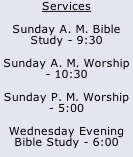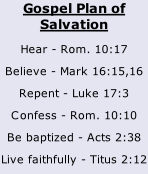








A basic understanding of the true nature of our God can come only from the Bible. Our ideas of Him develop over years of spiritual growth. If our fundamental understanding is wrong, we will never come to an adequate appreciation of what He requires of us. The following simple thoughts seem helpful in searching for deeper insight from the scriptures. See if you agree.
The God Head
A clear, simple concept of the God of the Bible is essential to the proper faith and practice of the religion of Christ. The Hebrew word translated God (Elohim') in Genesis 1:1is plural in number. It shows plurality in the persons of God. The New Testament also presents the same idea (John 1:1-
We ought not to think that the Godhead is like unto gold or silver or stone, graven by art and man’s device (Acts 17:29). Material representations of the Divine Being are idolatry (Exodus 20:4-
God (’Elohim) has revealed Himself as three Persons. Each one in the Godhead is a distinct person but always one in action, thought, and purpose with the other two in the Godhead. These three persons always moved in perfect unity, with each having a specific identity and work apart from the others.
The Father is the designer. The Son, (also designated the Word), is the executor. The Holy Ghost is the organizer. When we read of God in the Bible, it always helps to have these basic thoughts in mind: God, the Father, as Designer; God, the Son, as Executor; God, the Holy Ghost, as Organizer.
We see these three in the redemption of mankind. A proper understanding of their individual roles in this divine plan is essential to overcoming the often confusing and always conflicting denominational doctrines so prevalent today.
Our God in Redemption
We would expect to see the same unity of purpose and the definite assigned work in the revelation and enforcing of the scheme of redemption. The Father is the designer, the planner (Eph. 3:1 1; II Tim. 1 :9). It was His eternal purpose. It was His grace and it was to be expressed in His gospel (Titus 2:1 1).
The Son is the one who executes by taking the form of a man (John 1:14) and dying on the cross to save all mankind (I Tim. 1:15). The Holy Ghost then did His divine part by revealing the reasonable and orderly plan in the blew Testament. He did this by inspiring the apostles of Jesus.
Jesus gave the promise of the Father (infallible guidance) to His chosen apostles just before returning to the Father (John 14:25-
The Holy Spirit possesses all the divine attributes equally with God, the Father and God, the Son. He is co-
The term Holy Ghost equates with the expression Holy Spirit. They mean the same. The two English words translate one Greek word. He is a person and always functions as a person. He can be grieved (Eph. 4:30). The Holy Ghost or Holy Spirit is one person the same as God, the Father, and Jesus Christ, the Son are individual persons (Eph. 4:1-
Just as one individual cannot dwell literally within another person, so neither God the Father, Christ the Son, nor the Holy Spirit dwells in us personally. Such divine indwelling is a beautiful expression pointing to the closeness of our relationship to them. When one misapplies these scriptures by making them literal, he not only comes up with conflicting and confusing denominational doctrines but deprives himself of the real beauty of the revelation! The indwelling of the Godhead can only be effected by the words of the Eternal One. When this word is in the heart of the sincere individual it is God dwelling in us and we in Him!
God dwells in us. Christ dwells in us. The Holy Spirit dwells in us. We dwell in Them, that close! Such a close relationship is described by this beautiful and satisfying figure of speech. Other figures express the close relationship, such as we walk with Him; He leads us; we are His sons and daughters. These physical, worldly images are descriptive of the spiritual. Our God is spirit (John 4:24). If any one of them is taken literally, that conveys an unreasonable idea leading to confusion and often unwholesome superstition. Do not allow this to happen to you.
Carl G. Hecker, Firm Foundation, Feb. 1992

